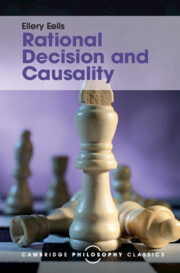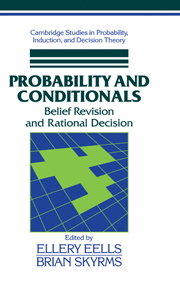Rational Decision and Causality
First published in 1982, Ellery Eells' original work on rational decision making had extensive implications for probability theorists, economists, statisticians and psychologists concerned with decision making and the employment of Bayesian principles. His analysis of the philosophical and psychological significance of Bayesian decision theories, causal decision theories and Newcomb's paradox continues to be influential in philosophy of science. His book is now revived for a new generation of readers and presented in a fresh twenty-first-century series livery, including a specially commissioned preface written by Brian Skyrms, illuminating its continuing importance and relevance to philosophical enquiry.
- Unique to Cambridge, this classic book has been revived and rebranded for a twenty-first-century readership
- Analyses the philosophical and psychological significance of rational decision theories
- Of interest to a range of readers, including probability theorists, economists, statisticians and psychologists
- Features a specially commissioned preface written by Brian Skyrms
Product details
August 2016Adobe eBook Reader
9781316560464
0 pages
0kg
7 b/w illus. 14 tables
This ISBN is for an eBook version which is distributed on our behalf by a third party.
Table of Contents
- Preface to this edition Brian Skyrms
- Introduction
- 1. Bayesianism
- 2. The philosophical and psychological significance of Bayesian decision theory
- 3. Bayesian decision theories: some details
- 4. The counterexamples
- 5. Causal decision theories
- 6. Common causes, reasons and symptotic acts
- 7. A general defence of PMCEU
- 8. Newcomb's paradox
- Appendices
- Bibliography
- Index.



